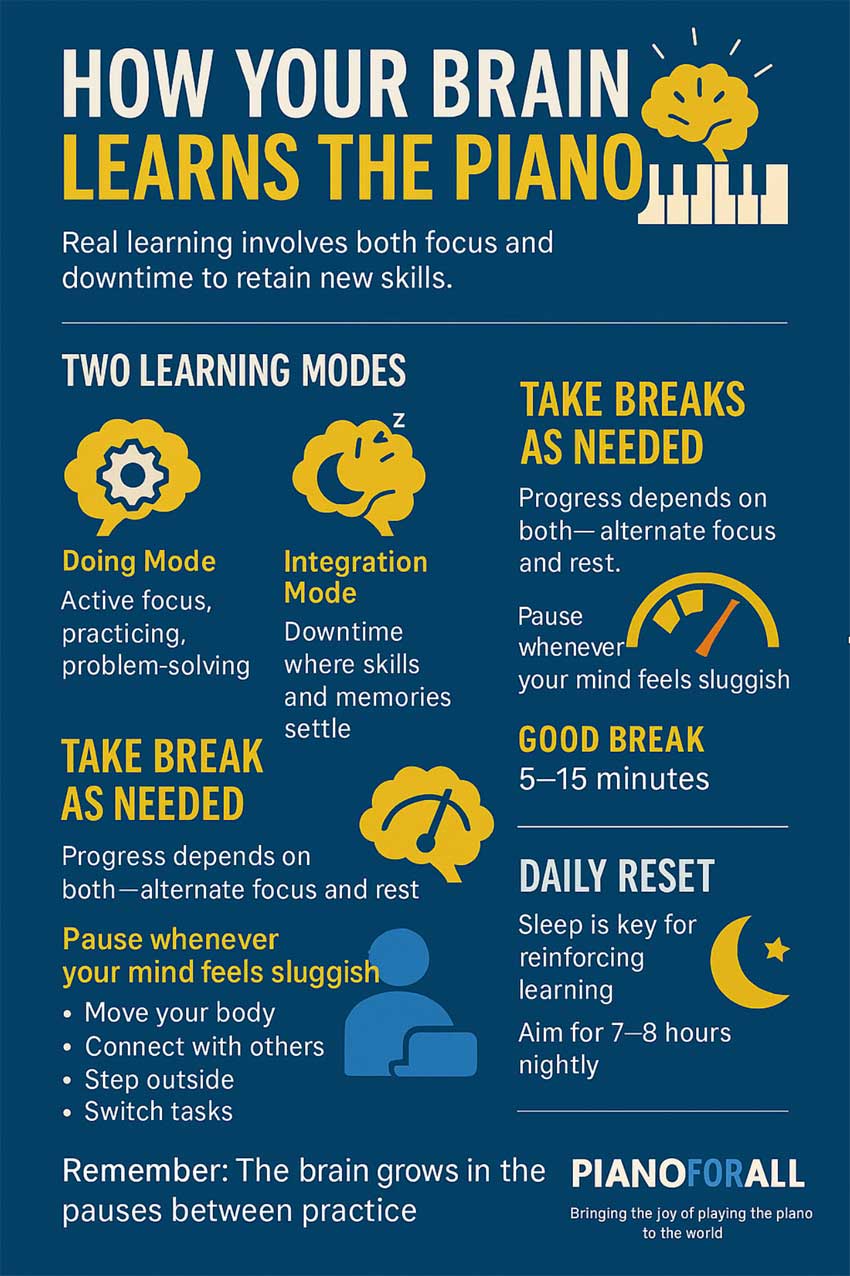Feeling guilty for stepping away from the piano? Don’t be. Breaks aren’t laziness — they’re essential for true learning. This article reveals how your brain actually consolidates skills between practice sessions, and how pausing at the right moments could be the secret to playing better, faster. Especially useful for adult beginners following flexible methods like Piano for All.
Imagine walking into a gym and deciding to use just one machine, for one exercise, on repeat. How long could you go? A few minutes? Maybe ten?
Now imagine you join a varied class — switching between movements, muscle groups, intensities. Chances are, you could last the whole hour. Maybe even stay for a second class if you’re in shape.
So why are you so surprised when your brain refuses to stay laser-focused for long stretches of piano practice or study?
Let’s borrow a metaphor, even if it’s imperfect: Your brain’s circuits are like muscles at the gym. They fatigue. They specialize. They need variation and recovery. If you keep forcing the same mental movement without pause, you shouldn’t be shocked when the system slows down or simply stalls.
[ez-toc]Your Brain Works in Two Modes — But Not at the Same Time
We tend to think of “learning” as something we do — exercises, memorizing a section of a music, solving problems. But real learning has two phases:
- Doing Mode: Active focus, repetition, absorbing information.
- Integration Mode: Downtime where what you’ve just done finds meaning, context, and space in your long-term memory.
These two don’t run simultaneously. They alternate, like inhaling and exhaling. So if you’re trying to “push through” for three hours straight, you’re skipping the phase where actual understanding is built.
And that’s a waste of perfectly good effort.
How Often Should You Pause?
There’s no single magic number, but most cognitive research and performance science suggest this: Avoid pushing past 90 minutes of focused mental effort without a break.
And even that depends on how well-rested and regulated you are.
More importantly, start listening to your system. If you feel your mind drifting, your attention lagging, or your fingers moving without intention — that’s your cue. The brain’s saying: I need a reset.
What Makes a Good Break?
You don’t need to sit in silence counting ceiling tiles. A “pause” doesn’t mean absence of activity — it just means switching activities, so different neural circuits get their turn while the tired ones rest.
And no, a break doesn’t mean scrolling social media. That’s cognitive junk food — your brain is still working, just on passive input.
Here’s what works better:
- Move your body — even standing up or walking around the room changes your state.
- Talk to someone — human connection restores mental flexibility.
- Step outside — green spaces reduce cortisol and restore creativity.
- Switch tasks completely — even washing dishes or walking the dogs counts.
And the duration? Again, no sabbaticals needed: 5 to 15 minutes is usually enough for a mental reset.
Just like you wouldn’t lift weights for hours without rest, your brain needs recovery between sets.
Daily Reset: The Ultimate Break
Let’s not forget the big one: Sleep. 7 to 9 hours. Every. Night.
Because while micro-breaks help you stay sharp throughout the day, real integration — the filing, cleaning up, and strengthening of memory and learning — happens while you sleep. You don’t need to do anything. Just don’t skip it.
Science-Backed Micro-Rules for Real Focus
Want a cheat sheet for effective mental resets? Here you go — short, actionable, backed by solid research:
- Even 1 minute is better than none. If that’s all you have, use it.
- Move. Stillness breeds stagnation — physically and mentally.
- Connect with others. Your brain thrives on human interaction.
- Get outside. Nature literally rewires your stress response.
- Switch. Stop talking or thinking about piano playing during your break. A break is a break.
Final Note: Music Happens Between the Notes — and So Does Growth
If you’re a piano learner, or anyone doing focused mental work, here’s the truth you need to internalize:
Your progress doesn’t only happen when you’re “working.” It happens in the pauses. In the transitions. In the moments you step away and let your brain catch up.
So next time you feel guilty for taking a break — don’t.
Instead, remember: The quality of your focus is defined by the quality of your recovery.
Train your mind like you’d train your body — with care, rhythm, and breath. You don’t just learn in the action. You grow in the intervals.
Will you share your thoughts in the comments section? Please, do!




